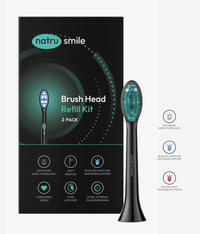
All products are certified by dental expert Dr. Greg Grillo
Avocado consumption is on the rise, with an 8.43 pound per capita consumption in the U.S. in 2021 (up from just 4 in 2010!) They’re a nutritious ingredient, packed with vitamins, minerals, fiber and healthy fats. But if you’ve recently undergone a teeth whitening procedure, can you still enjoy this delicious fruit?
To get right to it, the answer is yes – you can eat avocado after teeth whitening.
But there are also some intriguing connections between avocado and dental health that you might want to know. We’re talking about huge benefits for your gums, enamel, and more.
If you've just gotten your pearly whites done up, you'll likely have some anxiety about what foods to eat after whitening. Read on to learn more about whether avocado is safe to consume after a teeth whitening procedure and why.
Is It Recommended To Eat Avocado After Teeth Whitening?
Avocado can be combined with other ingredients that can cause problems.
Guacamole, for example, can contain acidity-causing ingredients like tomatoes, onions, and citrus juice. These can all erode away your newly whitened teeth’s protective enamel layer. The same goes for other dishes that include avocados, like salads and smoothies.
On its own, however, avocado is perfectly safe to eat after a whitening procedure. It’s low in acids, so it won’t damage your teeth.
Benefits Of Avocado On Teeth
That's right! Not only are avocados safe to eat after teeth cleaning or a whitening procedure, they actually offer some benefits.
Fight Tooth Decay
Research shows that polyphenols, a compound found in avocados, help stop bacteria, viruses, and fungi from affecting the mouth. That’s good news! These compounds can reduce cariogenic bacteria growth in your mouth and also decrease how much bacteria sticks to the surface of your teeth. Ultimately, this means your enamel gets a boost in erosion-protection for the long-term.
And that’s not all - avocados are chock full of potassium at 487mg per medium avocado (more than a banana). Consuming potassium can better the physical barrier at the tissue that connects your gums and teeth, so bacteria will have a harder time attacking and causing periodontal disease.
Magnesium
Magnesium is a huge part of what teeth are made up of, along with calcium and phosphorus. When we lack these minerals in our bodies, it can cause bone loss and underdevelopment of dentin or enamel.
There’s even evidence that magnesium deficiency is linked to periodontal disease, but it’s not as strong as other evidence.
One avocado contains 58 milligrams of magnesium, 14% of your daily value (DV), so you can ensure strong and healthy teeth.
Folic Acid
Folic acid can transform the status of your oral health. It plays a key role in red blood cell formation. But what does this have to do with your mouth? Oxygen needs to reach our cells, otherwise, we can experience a lack of color in the gums, a swollen tongue, and an impact on our mucous membranes.
Our mucous membranes are responsible for absorbing and transforming nutrients, but also as an immune barrier. Eating just half an avocado can give you 21% of your daily value.
Oral Cancer Prevention
A study published in Seminars in Cancer Biology found that hass avocados - the most popular avocado found in supermarkets across America, can kill or stop the growth of pre-cancerous cells that lead to oral cancer.
Avocados are a great protector of health due to the phytochemicals in the fruit.
The way they do this, in simple terms, is that they target the bad cells while preserving normal cells - a bit of selective targeting for the bad guys.
Ways To Eat Avocado That Are Safe For Teeth
If you’re looking for a way to enjoy avocado that won’t hurt your newly whitened teeth, there are several options.
- Mash up an avocado and spread it on toast or a cracker as a healthy topping.
- Add avocado to salads or smoothies without the acidity-causing ingredients mentioned previously.
- Fill avocado halves with herbs, non-staining spices, or other nutritious fillings like tuna or vegetables.
- Make sushi rolls
- Turn them into fries
- Blend them into ice cream or make ice pops
- Create a non-acidic dressing
- Add them to hummus
- Make a pasta sauce
Have we got you interested in the relationship between avocados and teeth? Here are some answers to commonly asked questions.
Does Avocado Stain Teeth?
No - in fact, polyphenols found in avocado can actually help protect your teeth from staining. How? These compounds bind to the enamel on your teeth and create a barrier that prevents staining agents from sticking.
Is Avocado Good For My Dental Health?
Avocados are high in healthy fats, vitamins and minerals that can help support your dental health. Their vitamins and minerals can strengthen dentin and enamel, prevent bacteria from forming and sticking, and improve the health of your mouth overall.
Is Avocado Good For Gum Disease?
The healthy fats and vitamins found in avocados can help promote gum health.
In addition, the compounds within them can help reduce inflammation, which is one of the main causes of gum disease. The heart-healthy monounsaturated fats and antioxidants that come in avocados help to do so.
Does Avocado Clean Your Teeth?
Avocado does not have any cleaning properties. However, it can help protect your teeth from staining and discoloration. Foods that may have cleaning properties include apples, carrots and celery due to their crunchy texture - and they can also freshen breath! This is because chewing on crunchy foods helps the mouth produce saliva, which in turn, washes away food particles and bacteria that cause plaque.
Does Avocado Cause Teeth Plaque?
Although not a crunchy food, avocados can help reduce the risk of plaque buildup by creating a protective barrier over the enamel on your teeth.










